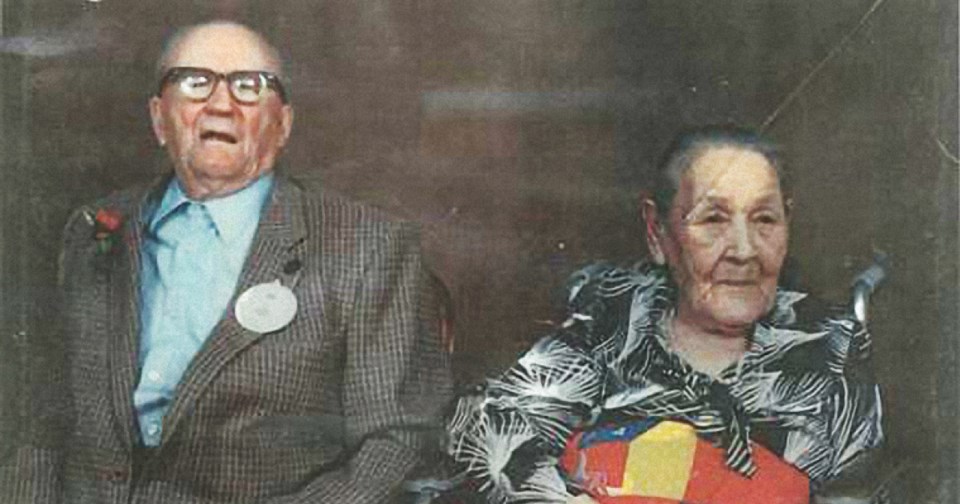David Crewe Patterson served in the First World War and is remembered by his grandson David Clinton.
Patterson marched into Russia in the war, served in the 371 Legion in La Ronge, and has a park in La Ronge named after him.
To Clinton he was his mooshum, the Cree word for grandfather.
He doesn’t remember much about his kokum, or grandmother, talking about the war, but he remembers the stories of the cold.
“It was cold. He froze his feet, the bitter cold. The discipline,” Clinton said. “He said they’re a strong people [Russians]. The people over there are very, very strong. They’re poor, they’re destitute poor. That’s some of the things that he said, and the cities were beautiful. But the cold.”
When his mooshum had a few drinks he would talk about the war, making some claims Clinton doesn’t know if he should believe.
“He would talk sometimes if he had a few drinks, he tried to save the Tsar,” Clinton said. “I don’t know if he did.”
Tsar Nicholas II, his wife Tsarina Alexandra and their four children Olga, Tatiana, Maria, and Anastasia, were killed by Russian troops. The family was shot and then the stabbed on July 16, 1918 in an execution that lasted 20 minutes. A fifth child, Alexei, died of hemophilia before the execution had taken place.
Every Remembrance Day, Clinton’s kokum would bring out Patterson’s uniform.
“Every once in a while on November he would bring out his tunic that didn’t fit anymore, his uniform,” Clinton said. “And he would [say], ‘why are you bringing this out? It doesn’t fit anymore.’ He would say to her, to his wife and she would bring it out and lay it on the bed. It had the sergeant’s stripes on it.”
Remembering his kokum
“You never told him when you were done splitting wood, he told you when you were done splitting wood,” Clinton said. “Because he was the boss, he wasn’t a dictator he wasn’t mean, when you had something coming good he would let you know but when he wanted to tell you something he would let you know firmly too.”
“He was very instrumental in bringing the smoke bombers to Saskatchewan,” Clinton said. “He worked closely with the smokejumpers and their jump master Frank Tompkins.”
The smokejumpers were Saskatchewan’s first aerial firefighting team.
He remembers his mooshum being an avid reader.
“And he read, big reader,” Clinton said. “Read like I do. Everything, and he made me read.”
Things he would make his grandson read include newspapers and non-fiction.
“He used to always like to read non-fiction, he said, ‘you’ll learn more.’”
Clinton’s favorite memory of his mooshum is when he asked him a question one day.
“You know, what do you think of these people picketing all over the place?”
It was during a time of a nurses’ strike. His mooshum responded.
“I got fired for not being able to afford a pair of work gloves.’ He said, ‘you get out there, you support them. Buy them a coffee, buy them a hamburger, whatever you want to buy them girls.’”
“It really touched me,” Clinton said. “Just the way he said it to me. Some things you got to stand up and make your stand.”
Another lesson he learned from his mooshum is sharing.
“He said to me, ‘the girls got to eat too, David. Never forget that.’ My uncles started laughing, my dad started laughing, mom and kokum started laughing and speaking Cree and I was sort of taken back by that. ”
When Patterson Park was named after him, his mooshum was invited to speak. That park happened to be across from a cafe that wouldn’t serve his family in the past as it was whites only.
“That same park, they were staying there, that weren’t allowed to go into that hotel, that cafe. That was a white man’s cafe. They went to the Indian cafe down the street,” Clinton said.
Clinton remembered looking at his kokum in the crowd, as his mooshum spoke.
“Yet that same park was named after her husband, and she was there. And she looked at me.”
And she grinned.
“That day when the speech was made, and he spoke, I couldn’t believe it. He was speaking there. And I was looking at kokum. Where she was not allowed to go in, she was in front of there, overlooking at that park and they were naming that park after her husband.”



